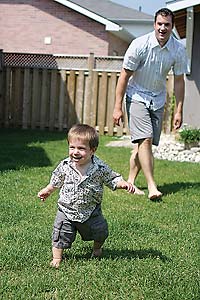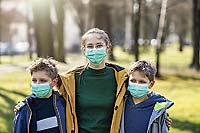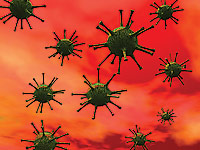|
|
HEALTHY HAPPENINGS September 2020
|
Resiliency in the Time of COVID-19
by Lauren Prest, MD |

Most of you don’t know me yet, I haven’t been in town very long. But, in the short time since I moved to Moab in August 2019 to become the Addiction Psychiatrist at Moab Regional I have been inspired by the warmth and proactivity of this community. As a psychiatrist I often care for people who have endured incredible hardships, but the strength required to seek and accept help remains one of the most awe-inspiring things about my job. Moabites have certainly endured terrible hardships and the people who stay here demonstrate a special type of grit. But, as is true with all survivors, “the body can only take so many hits before the cracks start to show”. So even the most resilient among us are bound to feel a shift in their reserve in these frightening and uncertain times. But sometimes, the cracks can shape us in surprising ways.
For some, mental health feels like something apart from regular medicine, something not so serious or something shameful. But, long before we had traditional medicine, it could be argued that mental wellness is all we really had under our control. After all, our camp could be washed away by floods, or a famine or drought could destroy our food sources, or a disease could sweep through our communities. To cope with these uncertainties, we used rituals and ceremony to create connection and meaning, herbs and special foods to nourish our body and soul, and tests of physical endurance to challenge our spirits and fortitude. These days, we have changed our lifestyles such that most of us have lost our sense of routine self-care. We may rely so much on the comforts of modern society that we have lost track of the power of our own ability to guide our sense of wonder. So, what can we do, when the pressures of the world are stealing our security and dependability? This is when re-building resilience and finding connection and meaning in our lives matters most. And perhaps this is when we start to rebuild a renewed sense of self-empowerment about what lies ahead.
Resilience refers to a person’s ability to sustain health and adapt through periods of stress. Resilience, like all fundamental mental health needs, is unfortunately not found in a day. It takes routine effort, like strengthening a muscle. Things that improve resilience often feel like they should be simple, like going to bed on time, limiting screen time, eating vegetables, and getting a little exercise. But, these are usually the first things we put aside when things get tough. Why would this be? Why would we deprive ourselves of self-care when we need it most? The answer probably lies in our most basic survival mechanisms. Simply put: instant gratification, meaning our brains choose the most rewarding and soothing activity to get through the moment. Our stressed, tired brains want high calories, physical relaxation, and mental distraction. Choosing instant gratification can happen spontaneously and without thinking. Those who have never struggled with substance use may find a little empathy here for those with addiction when you consider your own struggles with self-care- if it were easy, wouldn’t you be doing it already?
When your spiritual, emotional and physical tank is low, the first step in rebuilding can feel like the most difficult, so start with the most manageable and realistic change. For example, change often starts with thinking alone. Consider the pros and cons of taking a walk in the evening, calling your sister, or playing with your kid, instead of watching TV for another hour. Make a list of these pros and cons, or talk them out with a friend. Consider whether you have real balance in your life between work and play- are you working too much and neglecting your family, pets, health? Or, perhaps you are avoiding the work for distractions?- it can go both ways. Regardless, prioritize one impactful change at a time and practice this daily.
Certainly some people will have more on their plate than they can think their way out of. When this is the case, reaching out for help is best. You may need to see a medical professional or a therapist. You may need help with housing, rent, food, health insurance. You may need a day off work to run errands or make phone calls. You may need help escaping an abusive relationship. Remember, those who have experienced the most chaos and trauma are sometimes those who come out the other side stronger, more thoughtful, more creative, and with more appreciation of life than ever, but it can take time and the creation of new, safer spaces in our lives. Sometimes a little self-exploration can lead to tremendous post traumatic growth.
All in all, building resilience is a basic way to honor your humanity and your most basic needs. Setting boundaries by increasing balance in your life may help you feel a greater sense of control in an out of control world. As Austrian psychiatrist, Viktor Frankl said, “When we are no longer able to change a situation, we are challenged to change ourselves”. I know times are difficult, but there may be space between the hardships where we can find new meaning, greater connection, or to finally take that step forward toward self-care.
If you or someone you know needs help, please call one of the numbers below. Or, check out some of these helpful websites for guidance on increasing your wellness and resilience.
Resources:
Hotlines and treatment access:
National Disaster Distress Helpline: 800-985-5990 / 800-846-8517 (TTY) Utah Crisis line: 800-273-8255
MRH Mental Health access: 435-719-5531
Addiction treatment: 435-719-5585
Helpful websites: Happify.com - Tenpercent.com - Headspace.com - Tryhealthymind.org - Insighttimer.com Recoverypath.com - My.life - Superbetter.com
|
On the Upside
by Steve Proskauer |
It is heartening to see so many people wearing masks downtown, even little kids. l feel like we are learning to take good care of each other as this pandemic drags on through a hot summer. Even the vacation visitors seem to be respecting each other and their hosts, the people of Moab. 
Here the ancient rock formations all around us provide a constant reminder that our current problems – whether the novel coronavirus or systemic racism and violence against minorities or family and financial challenges – are happening in just a microsecond of geologic time. Arches will collapse as new arches are formed while the mighty Colorado River cycles through many seasons of flood and drought, yet the glowing red sandstone cliffs and mesas will remain long after each of us has gone. Against this majestic backdrop, what kind of legacy will we each leave behind?
The pandemic has interrupted our social habits and turned us inward to examine our priorities. Are we living the lives we came here to live? In our short time on this Earth amid the glories of nature, we can learn to love ourselves and our fellow creatures with all our hearts while helping each other fulfill our unique potential.
|
It’s the Terrain
by Ray Andrew MD |
In the 1800s, French chemist Louis Pasteur popularized the germ theory, proposing that microorganisms are the cause of most diseases. This paved the way for antibiotics—which kill both good and bad bacteria—and vaccines—which seek to prevent single diseases. By contrast, Pasteur’s friend, physiologist Claude Bernard, taught that the ‘terrain’ of the human body was more important than the ‘pathogens’ that infect it. We are surrounded by and even harbor microorganisms in our bodies. When exposed to pathogens, we become ill if our defenses are weakened by deficiencies or toxicities. Unlike the germ theory, the terrain theory explains why some people get sick while others, when exposed to the same pathogens, do not. 
On his death bed, Pasteur admitted, “Bernard was right: the pathogen is nothing, the terrain is everything.” Nearly 200 years later, health experts continue to ignore Bernard’s wisdom, focusing on finding ways to kill microorganisms. Conspicuously absent from the public pronouncements are recommendations to strengthen the immune system so it can protect you from the current pandemic, the next one, and the one after that.
While COVID-19 has led some to become paralyzed by fear, others have taken it as a wake-up call to get their health in order. There is actually a lot you can do to strengthen your immune system, and it doesn’t just work for Coronavirus. It works for all infectious diseases, cancer, autoimmune diseases, and degenerative diseases.
1) Eat real food. Like all other living human cells, immune cells are powered by mitochondria, which require oxygen, vitamins, minerals, and fat, not chemicals. In particular, refined sugar is an immune poison which paralyzes white blood cells.
2) Make sure you have enough micronutrients, especially vitamin C, zinc, and magnesium. Even organic food is deficient in micronutrients unless these are added to the soil prior to planting. Functional testing tells us whether you have enough of each micronutrient for your cells’ needs. 
3) Maximize oxygen delivery to your cells. Immune cells convert oxygen into ozone, hydrogen peroxide, and free radicals to destroy harmful microorganisms. Anything that reduces the oxygen that reaches those cells makes them less-effective scouts and warriors in your behalf. Tobacco smoke is particularly effective at diminishing cellular oxygen.
4) Get adequate unmedicated sleep. Sleep is essential for proper brain and immune function. A variety of factors cause insomnia. This leads many to resort to chemicals for sleep. Artificial sleep does not have the same brain supporting, healing, regenerating properties as natural sleep. Drugs used to produce artificial sleep actually increase infections, cancer, depression, suicide, motor vehicle crashes, falls, etc. Lifestyle changes, in combination with identification and treatment of underlying causes of insomnia, can often free people of the need for chemicals to knock them out at night.
5) Exercise in moderation. Exercise enhances your ability to fight off infection by increasing cellular oxygen, mobilizing white blood cells, increasing autonomic balance (see #8), reducing stress, and increasing healthy cytokines.
6) Optimize your vitamin D status. This hormone plays numerous roles in immunity, specifically against respiratory infections.
7) Take liposomal colostrum. The first milk a baby receives is colostrum, which is full of antibodies, growth and repair factors, immune messengers, and immune stimulants. Just as the healthiest infants benefit from their mothers’ colostrum, our healthiest patients take liposomal bovine colostrum.
8) Balance your autonomic nervous system. This system takes care of your breathing, heartbeat, digestion and absorption, blood pressure, and repairing damaged tissues. When you are asleep, the parasympathetic system is dominant. When you are in peril, excited, or need a lot of energy fast, the sympathetic system dominates. Other than that, they should be in a state of balance.
The majority of Americans live in a constant state of fight or flight, which is called sympathetic dominance. An unhealthy stress response shifts your body’s resources away from what you need most during a pandemic: a strong immune system. Balancing the autonomic nervous system is critical to robust immune function, not to mention heart and brain health. We can show you how.
9) A number of COVID-19 vaccines will be available soon. If you feel your interests are best served by focusing your immune system’s attention on a single microorganism, be sure that the vaccine you choose has been well tested for both long-term efficacy and safety, and is free of known brain and immune toxins.
These are some of the key steps you can start taking today to fix your terrain. There is no pharmaceutical product that will guarantee an infection-free life. But the steps above represent your best defense against all microscopic threats to your health and life. They also help you create health and resilience, which is far more beneficial than the absence of disease alone.
For the full version of this article, go to www.prestigewellnessinstitute.com/blog |
|
|
|
|
|
|
|
|
|
|
© 2002-2024 Moab Happenings. All rights
reserved.
Reproduction of information contained in this site is
expressly prohibited.
|
|